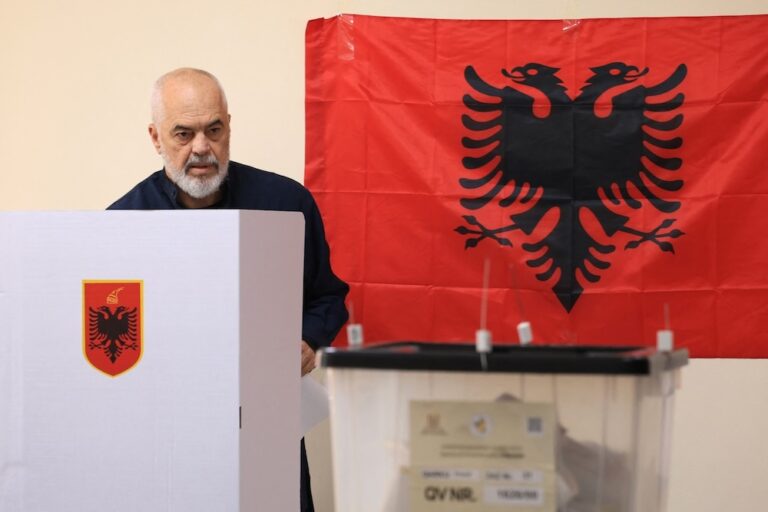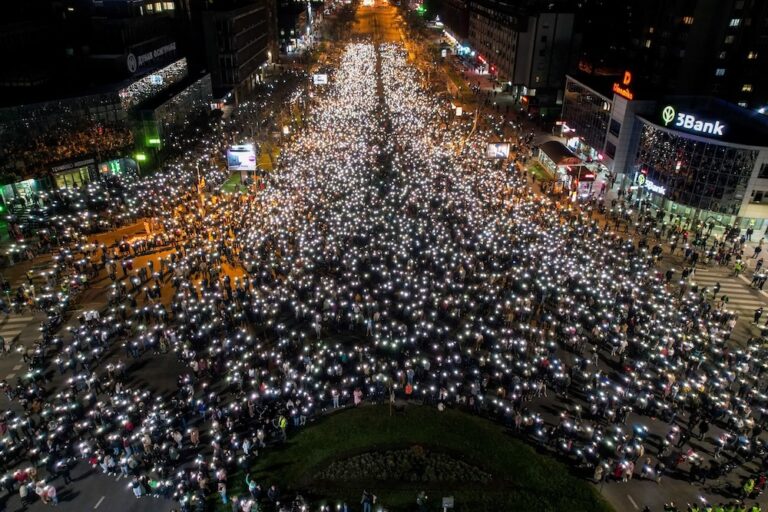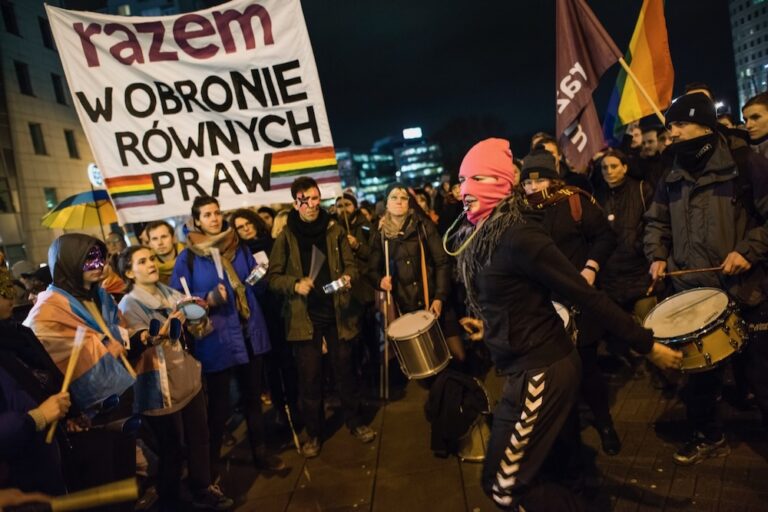October 2022 in Europe and Central Asia: A free expression round up produced by IFEX's Regional Editor Cathal Sheerin, based on IFEX member reports and news from the region.
October saw important wins in the battle against impunity, a historic anti-SLAPP conference in Strasbourg, and the adoption of a new ‘disinformation’ law that threatens free speech in Turkey. The month also saw a Nobel Peace Prize awarded to jailed Belarusian rights defender Ales Bialiatski.
The fight against impunity
While 2 November marks the International Day to End Impunity for Crimes against Journalists, October saw welcome developments in the efforts to bring to justice those involved in two of Europe’s most high-profile violent attacks on the press.
On 24 October, a court in France sentenced Ali Riza Polat to life in prison for complicity in the 2015 Islamist terrorist attack on the satirical magazine Charlie Hebdo. Another man, Amar Ramdani, received a 13-year prison sentence for conspiring with the attackers. Both men had been appealing their 2020 convictions. To date, a total of 14 people have been convicted for their involvement in the attack on the magazine’s Paris office, which left 12 dead and 11 wounded.
On 14 October, a court in Malta sentenced brothers Alfred and George Degiorgio to 40 years each in prison for the 2017 assassination of the investigative journalist Daphne Caruana Galizia. Five others have been arraigned in connection with the crime and are currently awaiting trial. Among them is businessman Yorgen Fenech, who is accused of commissioning the murder.
While the news of the Degiorgio brothers’ convictions was welcomed by IFEX and other free expression groups, we were compelled to raise our concerns – on the fifth anniversary of the crime – at the Maltese government’s failure to implement the recommendations of the landmark Public Inquiry into Caruana Galizia’s murder, and at the exclusion of structured public consultation on proposed legal amendments relating to the safety of journalists and Strategic Lawsuits Against Pubic Participation (SLAPPs).
On 20 October, the European Parliament adopted a resolution echoing these concerns.
The European anti-SLAPP movement
Daphne Caruana Galizia was one of Europe’s most prominent targets for SLAPPs (abusive lawsuits aimed at silencing critical voices). She was facing approximately 47 active defamation lawsuits at the time of her death in 2017, the year that the European anti-SLAPP movement began.
Several free expression groups – including IFEX members – were involved in this push for anti-SLAPP legislation from the start, and, in 2021, the Case Coalition against SLAPPs was launched. In April 2022, the European Commission proposed an Anti-SLAPP directive and a recommendation to member states. This proposed directive is also known as “Daphne’s law”.
This month, on 19 October, the Case Coalition and the European Centre for Press and Media Freedom hosted a historic, first ever anti-SLAPP conference [VIDEO] in Europe.
Speakers included the President of the European Parliament, Roberta Metsola, the Vice President of the European Commission for Values and Transparency, Věra Jourová, the Secretary General of the Council of Europe, Marija Pejčinović Burić, the Council of Europe’s Commissioner for Human Rights, Dunja Mijatović, and the Director of the Daphne Caruana Galizia Foundation, Matthew Caruana Galizia.
Following the conference, the Case Coalition issued an anti-SLAPP call to action, urging governments across Europe to take immediate legislative and practical action to protect journalists and other public watchdogs from the growing threat of these abusive lawsuits. A full list of recommendations to the EU, Council of Europe member states and international bodies can be viewed here.
Although journalists are the most frequent targets of SLAPPs, it is timely to note – ahead of November’s UN Climate Change Conference (COP 27) – that environmental activists also regularly find themselves facing lawsuits intended to silence them.
Examples abound: in March 2022, an agribusiness in Spain sued Greenpeace Spain for defamation after the environmentalist group exposed water and soil pollution caused by a giant industrial cow farm; in September 2020, Valérie Murat, an anti-pesticide activist in France, was sued for denigration by the inter-trade organisation for Bordeaux wines after publishing findings about toxic pesticide residues in their produce; in June 2020, Austrian-based Kelkos Energy launched defamation suits against Shpresa Loshaj and Adriatik Gacaferi – environmental activists in Kosovo – after they raised concerns about the environmental impact of hydropower projects.
Free expression threatened ahead of elections
One of the most disturbing developments in Turkey this month was the adoption of the so-called ‘disinformation law’ (frequently dubbed the ‘censorship law’). This new legislation – consisting of 40 articles amending several laws – makes “disseminating false information” a criminal offence with punishments of up to three years in prison.
IFEX members and other press freedom groups have condemned the new law which, in the run up to the 2023 presidential and parliamentary elections, threatens to shut down criticism online, increase self-censorship and deny citizens access to information. Rights groups have pointed to how the vagueness of the definition of “false information” could be abused by Turkey’s heavily-politicised judicial system.
According to interviews conducted by Bianet, several journalists intend to carry on practising their profession regardless. As İzel Sezer, the chief editor of İleri Haber, put it: “If necessary we will communicate through smoke signals but we will continue to search for the truth.”
The Turkish authorities’ abuse of anti-terrorism legislation to target journalists and activists is well known. On 25 October, eleven Kurdish journalists were detained in raids across five cities as part of what authorities claimed was an “anti-terror operation”.
The majority of those detained (seven) were women journalists. According to the Coalition for Women in Journalism (CFWIJ), Turkey currently leads the world in detaining women journalists: since the beginning of the year, 28 women journalists have been detained – a 27% increase on the figure for 2021.
Next month, PEN Norway will host a panel discussion (14 November) focused on women’s resistance to authoritarianism in Turkey. Subjects to be discussed by the all-women panel include: the role of women reporting in court, the Gezi Park trial, and the government’s attempts to close down anti-femicide organisations in Turkey.
A Nobel Prize and draconian sentences
In recognition for his human rights work in Belarus, rights defender Ales Bialiatski was awarded the Nobel Peace Prize in October. Arrested in 2021 as part of President Lukashenka’s “purge” of civil society, Bialiatski is currently behind bars and faces between seven and 12 years in prison if convicted on spurious charges.
October continued the pattern of recent months, and saw several journalists handed draconian prison sentences solely for practising their profession or for voicing criticism of Lukashenka’s regime.
On 26 October, Siarhei Satsuk, chief editor of the independent Yezhednevnik news website, was convicted of taking a bribe, inciting hatred, and abusing power or authority: he was sentenced to eight years in prison. Earlier in the month, three former and current employees of the independent news agency BelaPAN were handed heavy prison sentences on a range of trumped-up charges: Andrei Aliaksandrau received 14 years, Dzmitry Navazhylau was given six years, and Iryna Leushyna was handed four years. Aliaksandrau’s wife, Iryna Zlobina, received a nine-year sentence.
There are currently over 1,330 political prisoners in Belarus. Two of these, Maryna Zolatava and Liudmila Chekina (respectively editor-in-chief and CEO of the independent news outlet TUT.BY), were added to the KGB’s growing list of “terrorists” on 20 October.
Poland’s war on reproductive rights
In Poland, October saw the second anniversary of the 2020 Constitutional Court ruling that approved a near-total ban on all abortion.
At the time of the ruling, hundreds of thousands of people – mainly women – took to the streets to protest this attack on women’s reproductive rights. In many cases, the police dispersed the demonstrations using violence. Since then, prosecutors have filed an indictment against three women – Marta Lempart, Klementyna Suchanow and Agnieszka Czerederecka-Fabin of the All-Poland Women’s Strike – who led the protests: they are accused of endangering public health and “causing an epidemiological threat”.
Human Rights Watch’s Letta Tayler published an article this month looking back over the last two years and outlining what the EU should do to pressure Poland to “uphold the right to comprehensive sexual and reproductive health care as part of their fundamental rights obligations”.
Since the Constitutional Court ruling, several pregnant women have died because doctors refused to perform an abortion. A recent poll showed that 65% of Poles are in favour of the right to abortion up to the 12th week of pregnancy.



